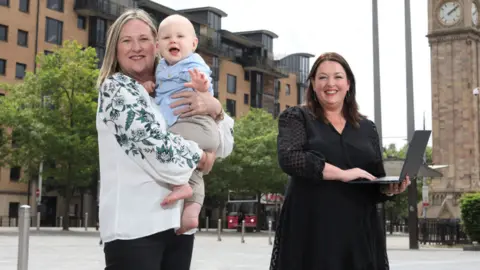Childcare: Call for NI Executive to cut costs for parents
 FSB
FSBTackling childcare costs must be a priority for the executive, two business groups have said.
The Federation of Small Businesses (FSB) and Women In Business NI said lack of investment in a childcare policy is "now an emergency".
Costs in Northern Ireland are the second highest of 24 European countries examined by Ulster University.
Women in Business NI said it was a "major factor in a parent's ability to work".
Roseann Kelly, from the organisation, said it could be unaffordable for parents to return to work because of the lack of subsidy, with childcare costs accounting for 37% of the average wage of a two-parent family.
"This makes Northern Ireland a relatively expensive location for childcare in comparison to other European countries who do more to assist parents," she said.
"We need to adopt a more progressive approach to childcare, much as we do with health and education and accept that if we are to see the dividends of a post-pandemic economic growth, attracting more employers and investment, we need to tackle the greatest obstacle facing those who want to work or start a business but cannot because of childcare constraints."

 Crilly family
Crilly family'For some it is not manageable'
Aine Crilly, a full-time human resources consultant from County Armagh, uses childcare services.
She said childcare costs for her three and four-year-old children could really "add up".
"Certainly the costs are significant, it is about £170 per week in my local area, but that could be up to a third of somebody's weekly wage," she said.
"For some people it is not manageable at all and it is easier to stay at home."
Ms Crilly told BBC's Good Morning Ulster programme that managing childcare was particularly challenging during the pandemic for her a self-employed woman.
"I had to work around children, so worked at night and looked after the children during the day," she said.
Ms Crilly said she felt Covid-19 had shown flexible working can work.
"We need to remember it is really important for women to be role models for their children for our own career progression," she said.
"There needs to be an encouragement from employers to look at other ways of working."

On Monday, Strangford assembly member (MLA) Michelle McIlveen replaced Peter Weir as education minister and North Antrim MLA Paul Frew replaced Diane Dodds as economy minister.
Tina McKenzie, from the FSB, said they would engage with the new ministers to "finally deliver flexible, affordable and accessible childcare".
She said Northern Ireland needed to catch up with other countries.
"Despite years of sustained campaigning, Northern Ireland continues to be without proper government support for flexible, affordable and sustainable childcare," said Ms McKenzie.
"The cost of childcare remains prohibitive for many families, which therefore restricts choice in terms of the role parents can play in the economy.
"While the recent action to provide childcare grants for those on Universal Credit was a positive step, something much more comprehensive is required to fully address the issue.
"Just as the pandemic has accelerated change in other areas, it must also be the catalyst for progress in the delivery of a fully funded childcare strategy."
The Department of Education said developing and delivering Covid-19 related support schemes for the childcare sector continued and required significant staff time.
It said it was assessing the state of the sector following the pandemic and re-engaging with key stakeholders to review the assumptions and actions previously set out within the draft Childcare Strategy (2015) and the New Decade New Approach commitment to an extended early education and care offer for children aged three to four.
A spokesperson said the department would take on board the learning over the past year as a result of supporting the childcare sector through the Covid-19 pandemic.
A Department for the Economy spokesperson said its recovery action plan set out a range of actions to support local businesses.
"We recognise the lack of affordable childcare can often act as a barrier for many parents looking to get back into work," a spokesperson said.
"The minister supports the work of his executive colleagues who are taking forward plans to increase support for childcare.
"The department already has a range of policies and legislation in place which support working parents in other ways, such as the right to request flexible working, maternity, paternity and shared parental leave."
